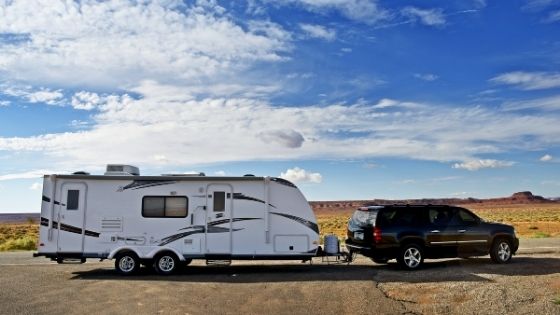Campers and outdoorsmen prefer to have a mobile home when exploring one national park to another. And for this reason, many happy campers purchase a travel trailer. Not only is a travel trailer affordable, but it also offers many benefits compared to a motorized RV. For example we often hear the news like truck break down happens or such other similar incidents as well. So in order to avoid any kinds of such things it is always important to keep the safety on the utmost importance. It is one of the best safe way to use travel trailer as compared to other motorized vehicles which are prone to many danger and risks at road.
But what is a travel trailer exactly? Let’s define what makes it different from a motorized RV.
A travel trailer is a non-motorized RV or rig that only has wheels in the rear. The front is typically connected to a towing vehicle via a lever. A travel trailer is excellent for camping and moving around as you can unhook the lever and use your towing vehicle to go around the area without the burden of a huge trailer in tow.

It’s usually 13 to 40 feet in size and can sleep up to 10 people. But aside from the convenience of being able to unhook the trailer, many travel trailer drivers have one dilemma – towing the travel trailer safely.
One wrong miscalculation of towing the trailer can lead to a serious road accident. So if you’re planning on your next camping trip, make sure to do these seven tips for safely towing a travel trailer.
1. Know the RV’s GVWR
GVWR or gross vehicle weight rating is the measurement of the total weight capacity of the RV or travel trailer. This is extremely crucial because you need to know if your towing vehicle can carry the total trailer’s weight. If you need help to determine this, consult the experts from tow truck Graham companies.
2. Ensure the tow vehicle is in excellent condition
Once you know your RV’s GVWR, make sure that your tow vehicle’s capacity to tow it is above that number. This will include all the things and equipment that you’re carrying inside the trailer. Moreover, you can have your vehicle checked at the automobile shop to ensure that it’s in great condition before hitting the road.
3. Travel light
Having a travel trailer and ample space is tempting enough to bring whatever you want, even if you don’t need it. However, this will add unnecessary weight that can pose a huge issue when you’re driving long trips or turning. Make sure that you pack only what you need. Traveling light means you have fewer things to take care of.
4. Use and connect durable safety chains
Aside from tow mirrors, safety chains are what separate you from safety on the road. These chains connect your vehicle to your travel trailer. That being said, invest in expensive and reliable safety chains. Moreover, make sure that you connect the chains while crossing it, instead of hooking it straight. This way, you have leeway in case the chain gets disconnected.
5. Ensure proper trailer weight distribution
Driving around with a colossal trailer behind you can be a drag, especially if most of the weight is distributed in the rear of the RV. A rule of thumb in trailer weight distribution is to put 60 percent of the weight in front. This way, you’re not creating “drag” when the rear is weightier than the front. So it’s recommended to put all the heavier equipment and appliances in front.
6. Drive slow
Towing a trailer shouldn’t be a race. It’s challenging enough carrying a massive weight, how much more when you’re turning or backing up. That said, drive slow and enjoy the long journey. Furthermore, when making turns, make sure that the travel trailer’s wheels go inside the curb, so ensure that you’re making wider turns.
7. Prevent abrupt stops
Driving your sedan is undeniably different that driving your car with an RV behind you. It’s safe to say stepping on the breaks might be all to new for you. One safety tip is to apply the breaks slowly. Prevent sudden or abrupt stops as this impacts the weight behind you. Always anticipate when you’re stopping, so you can step on the breaks as gently as possible.
